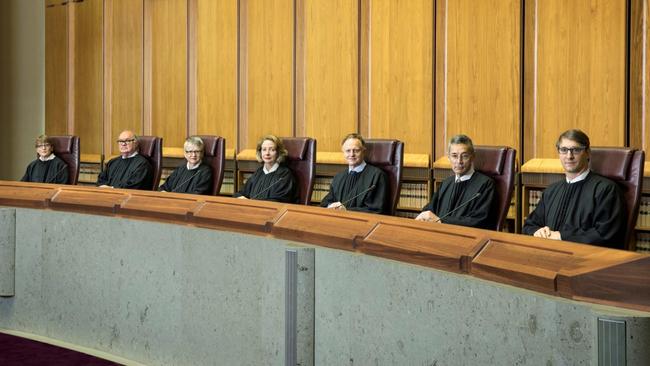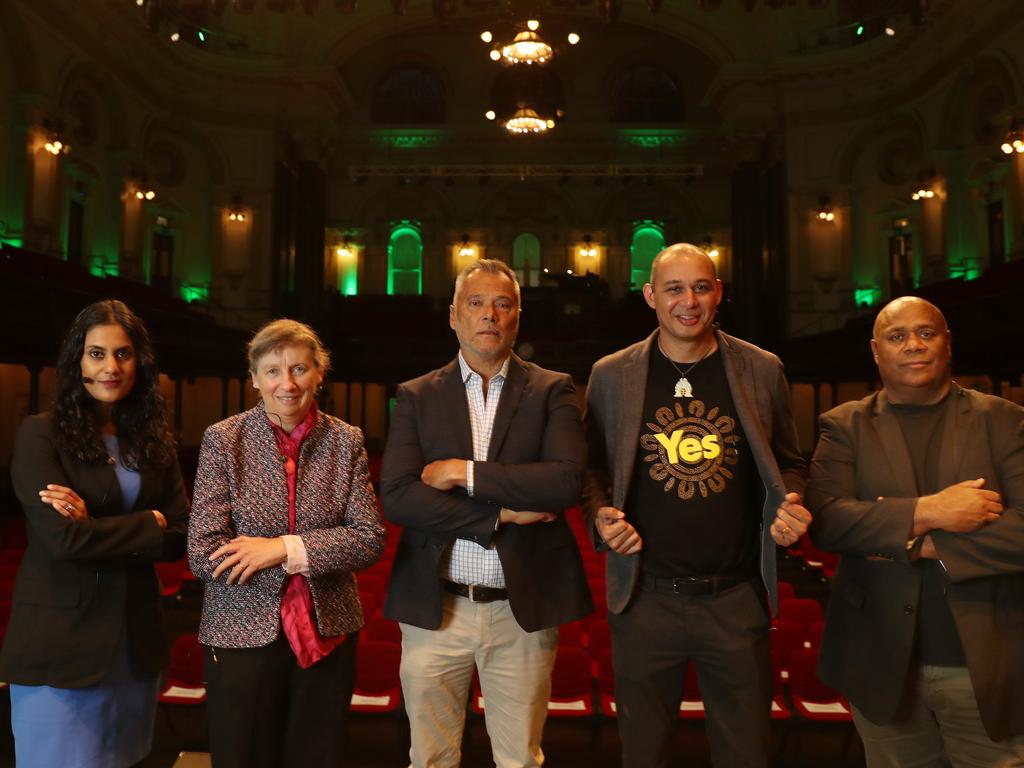Beware the double-edged sword of judicial activism
With respect to the new High Court chief justice, a bigger issue for legitimacy is staring us in the face.

Speaking about an issue this country can ill afford to grow complacent about, the nation’s most senior judge told a judges’ conference late last year that he took “judicial legitimacy” to mean “that level of public confidence which needs to exist for a competent and impartial judiciary to do its job of deciding controversies according to law without fear or favour”.
Gageler said he examined at some length the reaction to the US Supreme Court decision on abortion rights in Dobbs v Jackson Women’s Health Organisation, which overruled Roe v Wade. In a discussion of the violent reactions to the decision, he particularly mentioned President Joe Biden’s statement that the decision was “the realisation of an extreme ideology” and a “tragic error”, and former president Donald Trump claiming credit for the decision.
The High Court judge reluctantly concluded these reactions were “manifestations of an erosion of judicial legitimacy resulting from a realistic perception that a partisan process of judicial appointment had led to a partisan judiciary”.
With respect to our incoming chief justice, he spotted the small problem while entirely missing the bigger, more important, one.
Yes, Gageler is right that the US process for selecting judges has become entirely partisan and is now little more than just another opportunity for Republicans and Democrats to play politics by other means.
Gageler is also right to point out that the rot set in when in 2013 a Democrat-controlled Senate dropped the effective requirement for bipartisan support (the so-called filibuster) for lower court judicial nominees. This inevitably and predictably led to a Republican-controlled Senate dropping the requirement for bipartisan support for Supreme Court nominations in 2017. As it turned out, everyone lost when Democrats overlooked the biblical warning that you reap what you sow.
Gageler may also be right that a return to the requirement for bipartisan support for judicial appointments could be the solution.

However interesting the process of choosing judges is, this is not the main issue bedevilling judicial legitimacy. The largest single factor in maintaining judicial legitimacy is not how judges are appointed but what they are called on to decide.
If judges are asked to answer political questions, as distinct from legal questions, it is impossible for them to avoid becoming politicians rather than judges. Not only do judges lack the skills and training to adjudicate on issues of public policy, their status as unelected executors of the policy set by elected legislators means they have no legitimacy in doing so.
If the US Supreme Court has a crisis of legitimacy, it is largely (though by no means exclusively) because it is required to interpret and implement the bill of rights. This document is a poetic and inspiring set of principles but also, essentially, political in nature.
Bills of rights, or charters of rights, exist the world over and what they mean depends on your political philosophy. They are deliberately designed to give judges large and discretionary licence to create law. That is why many legal, political and social activists love them. Or at least they love them for so long as they are in charge of their interpretation. For judicial activism, once unleashed, is a two-edged sword. In 1973, fans of judicial activism cheered from the rooftops when the US Supreme Court invented out of whole cloth a right to abortion. At the time, conservatives outraged by Roe v Wade were uttering exactly the fulminations Biden let loose when Roe v Wade was overturned.

The truth is that if you admit the possibility of left-wing judicial activism, you simultaneously create the possibility, indeed inevitability, of right-wing judicial activism of an equal and opposite kind. Moreover, once you advocate for left-wing judicial activism you lose any right to complain, logically at least, about equal and opposite right-wing judicial activism.
It is the allowance of these kinds of violent judicial swings of fashion that most corrodes judicial legitimacy. Judicial activism, whatever the political persuasion, is to be deplored for the simple reason that it means an infinitesimally small group of judges, not elected representatives of the people, end up running large swathes of social policy.
Sir Owen Dixon, Australia’s greatest chief justice, is rightly revered for pointing out the touchstone of judicial legitimacy: “Close adherence to legal reasoning is the only way to maintain the confidence of all parties in federal conflicts. It may be that court is thought to be excessively legalistic. I should be sorry to think that it is anything else. There is no other safe guide to judicial decisions in great conflicts than a strict and complete legalism.”
Ever since Plato wrote The Republic, and no doubt before that, debate has raged about the ideal form of governance of societies. Democracy has its critics, including Plato. Fans of bills of rights have much in common with Socrates, as recorded by Plato, in that they essentially prefer philosopher kings (called judges in the modern framework) to democracy.
Democracy can be messy, slow and, so say the impatient and sometimes snooty activists, stupid and oppressive on occasions. That is why activists say you need bills of rights – to shift power to judges to correct these vices at a rapid pace.
The abortion debate in the US should be the only answer one needs to that contention. Half the population hated Roe v Wade, the other half hate the Dobbs decision. Instead of the US Supreme Court trying to do an end run around democracy in Roe v Wade, how much better off would the US, and its respect for its judiciary, have been if, in 1973, the US Supreme Court had simply declined to act as a philosopher king and simply left abortion to the democratic decision of each of its states?
The Wall Street Journal recently published a state-by-state guide to abortion laws in the US after the Dobbs decision. It shows that about 43 per cent of reproductive age women live in states where abortion access is protected, 44 per cent live in states where there are bans or restrictions on access, and the balance live in states without bans or protection.
Love or loathe access to abortion, these democratic processes seem like a good proxy for the spread of beliefs on this issue across the US.
If the Supreme Court made the rules, no doubt one side or the other would have a 100 per cent victory for their beliefs – a victory that could swing from one side to the other depending on the composition of the court. That is precisely why judges who make policy on matters of social or political contention doom their profession to illegitimacy.

Dixon was right. If Gageler wants to protect the legitimacy Australian judges enjoy, we should expect to hear him in future point out the flaws with an Australian bill of rights.
It is especially interesting that Gageler, in his speech to judges in Hobart last October, chose to focus on how judges are appointed when speaking about judicial legitimacy, when the bigger issue for legitimacy is staring us – that means Australia too – in the face.
After all, as one of the three minority judges in the 2020 decision, Love v Cth, Gageler chastised the majority for concocting a new constitutionally privileged position for a group of people by virtue of their biological descent.
Gageler objected in principle “to the judicial creation of any race-based constitutional distinction irrespective of how benign the particular distinction contended for might seem”.
In a similar vein, outgoing Chief Justice Susan Kiefel, another of the dissenting judges, said: “It is not for this court to determine whether persons having the characteristics of the plaintiffs are aliens. Such an approach would involve matters of values and policy. It would usurp the role of parliament.”
This is not an issue Australia can afford to grow complacent about. We have our fair share of preachy policymakers at all levels of the judiciary. Federal Court judge Mordecai Bromberg was instrumental in trying to redefine a casual employment contract as a permanent employment contract.
A unanimous High Court overturned that result, remarking that “it is no part of the judicial function to reshape or recast a contractual relationship in order to reflect a quasi-legislative judgment as to the just settlement of an industrial dispute”.
Far more important than how judges are chosen is what judges are called on to decide. Judges who are forced, or are allowed, or imagine they are entitled to decide political issues will ultimately be regarded as just another bunch of politicians. Better educated and better dressed, perhaps, but still just political hacks.








As the newly appointed chief justice of the High Court, it is worth revisiting what Stephen Gageler makes of judicial legitimacy.